Biden Welcomes Saudi Decision To Open Airspace For Israeli Overflights
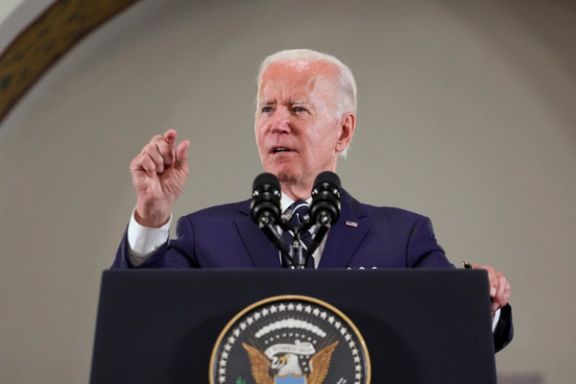
Saudi Arabia will allow overflights to and from Israel, in a decision welcomed by US President Joe Biden who is visiting the kingdom on Friday.

Saudi Arabia will allow overflights to and from Israel, in a decision welcomed by US President Joe Biden who is visiting the kingdom on Friday.
The Saudi General Authority of Civil Aviation (GACA) said the country's airspace was now open to all carriers that meet its requirements for overflights, in line with international conventions that say there should be no discrimination between civil aircraft.
The decision will "complement the efforts aimed at consolidating the kingdom's position as a global hub connecting three continents and to enhance international air connectivity," GACA added in a statement.
Bypassing Saudi Arabian airspace had added to flight times and increased fuel burn on some services to and from Israel.
US President Joe Biden welcomed the decision and said it was an important step towards building a more integrated and stable Middle East region.
"Today, I will be the first president of the United States to fly from Israel to Jeddah, Saudi Arabia. As we mark this important moment, Saudi Arabia’s decision can help build momentum toward Israel’s further integration into the region, including with Saudi Arabia," Biden said in a statement.
Saudi Arabia, Islam's birthplace, does not recognize Israel and has said nothing of possible bilateral developments during Biden's visit. Israel has also shied from drawing such links.
Despite the absence of official ties, Saudi Arabia agreed in 2020 to allow Israel-United Arab Emirates flights to cross its territory.
Reporting by Reuters
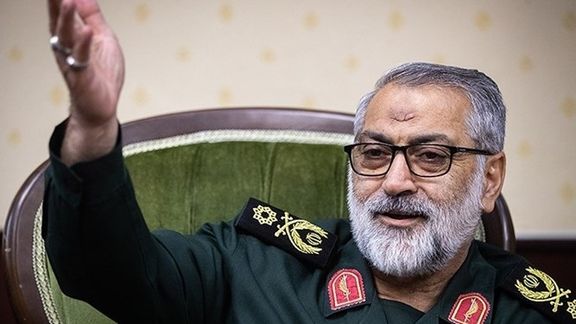
US President Joe Biden’s threat to resort to use force against Iran is the result of his “sleepiness”, the spokesman of Iran’s armed forces said on Friday.
Local media quoted Brigadier Gen. Abolfazl Shekarchi as saying: “The use the phrase “resorting to force” by the "poor" American president and "the helpless" prime minister of the fake Zionist regime is an attempt at psychological warfare, delusion and sleepiness they are known for.”
The use of “sleepiness” by the Iranian official was a clear case of ‘plagiarism’ by the Iranian military spokesman taken from Tehran’s arch foe, former US President Donald Trump who called President Biden “sleepy Joe” during the last presidential campaign.
“The Americans and Zionists (Israel) know very well the price for using the word 'force against Iran,'" Shekarchi said.
"Biden must have been sleepy when he threatened Iran," he said, adding, "Watch your soldiers’ pants - they might get wet in the Persian Gulf!”
The Islamic Republic has tried to put a brave face during Biden’s regional tour, which started with the US President telling an Israeli television that he would be willing to use force against Iran “as a last resort”, if it tries to build nuclear weapons.
This clear statement showing his intention to strengthen ties with America’s traditional allies in the Middle East was followed by a Joint Declaration with Israel on July 14, giving a shared commitment to Israel’s military supremacy and preventing Iran from building nuclear weapons.
The declaration was followed by Israeli national security advisor Eyal Hulata telling Israel’s Channel 13 that his government will act as it sees fit regarding the Iranian threat. “We are not afraid to tell the Americans that we have differences of opinion with them, or that even inside Iran we carry out operations,” adding that Israel acts according to its own determinations.
Hulata came out openly acknowledging that Israel has carried out attacks inside Iran, especially “in the past one year”, insisting that the US “supports us” and Israel’s operation do not harm its relations with the US President.
Despite these statements, Iran’s foreign ministry showed a low-key reaction on Fridayto developments during Biden’s trip to Israel.
The ministry spokesman Naser Kanani wrote on Twitter that the United States issued a clear and lasting commitment to protect Israel and its military superiority, in the Joint Declaration. But he added, “Make no mistake. The target [of the declaration] is not just Iran, but all Arab and Muslim countries should accept Israel’s superiority.” He concluded, “Therefore, the main source of threat for the region is completely clear.”
The official government new website IRNA also argued that the US military guarantees to Israel are nothing new and come from the past decades.
Iran’s defiant foreign policy seems to be caught between two opposing forces. On the one hand officials, usually military commanders, issue strong statements and even threats, while sometimes others sound low-key or try to dispel the specter of a military threat and more isolation.
The reason is the country’s domestic economic crisis, that many recognize as the result of decades of anti-West and anti-Israel policies. The social and economic crisis has reached a point that some officials sometimes try not to anger the people by more bellicose postures.
Nevertheless, IRNA called the US-Israeli declaration an “anti-Iranian” statement, denying that Tehran poses any threat to regional countries to warrant a US policy of fostering an alliance among its allies.
But Tehran is continuing uranium enrichment and is said to have enough fissile material at this point to produce a nuclear weapon, while more than a year of nuclear talks with the US have remained stalled.
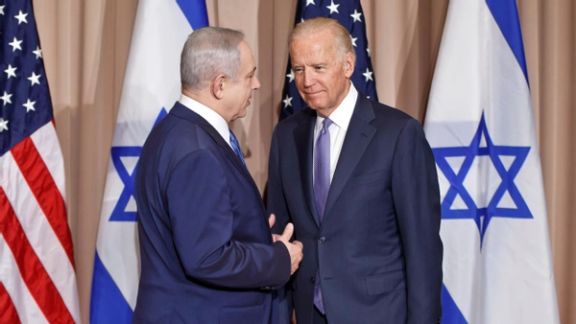
In a meeting with visiting US President Joe Biden on Thursday, former Israeli Premier Benjamin Netanyahu stressed the necessity of a military option against Iran.
Netanyahu, who is now head of the opposition, told Biden that "if and when" he returns to office, his hard stance on Iran will remain the same, claiming that “Biden said he agrees with my position and I was glad to hear that. This is what I will do if and when I return to the Prime Minister's Office."
Discussing the Iranian nuclear issue, Bibi said, "Without a reliable military option, it will be impossible to stop Iran, and if it is not deterred, the military option must be exercised."
Netanyahu added that to ensure US-Israeli friendship for the next 40 years “we have to address the Iranian threat,” noting that "Economic sanctions and even a defensive pact are not enough, there is a need for a military-offensive option on Iran, without it, nothing will work."
Earlier in the day, Biden and Israeli Prime Minister Yair Lapid signed a declaration on a shared commitment to Israel’s military supremacy and preventing Iran from building nuclear weapons.
Washington pledged further “defense assistance” on top of the $38 billion 10-year Memorandum of Understanding signed in 2016 under President Barack Obama and the $1-billion assistance after the 2021 Israeli-Palestinian violence centered on Gaza.
The document – dubbed the ‘Jerusalem Declaration’ – singled out as integral “to this pledge…the commitment never to allow Iran to acquire a nuclear weapon.” The US was, it said, “prepared to use all elements of its national power to ensure that outcome.”
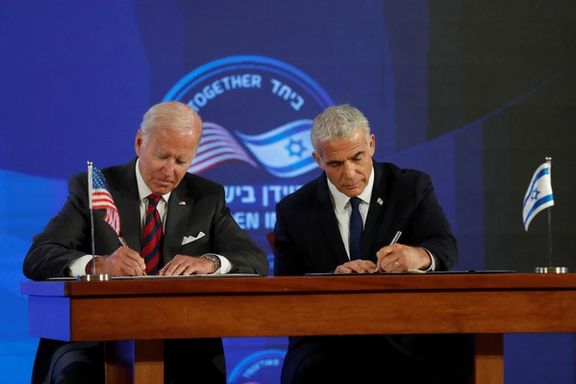
Wednesday’s US-Israel Joint Declaration gave a shared commitment to Israel’s military supremacy and prevent Iran from building nuclear weapons.
The declaration, with the text signed by Israeli Minister Yair Lapid and United States President Joe Biden released Thursday, expressed “unshakeable US commitment” to Israel’s “military edge.” Washington pledged further “defense assistance” on top of the $38 billion 10-year Memorandum of Understanding in 2016 under President Barack Obama and the $1-billion assistance after the 2021 Israeli-Palestinian violence centered on Gaza.
The document – dubbed the ‘Jerusalem Declaration’ – singled out as integral “to this pledge…the commitment never to allow Iran to acquire a nuclear weapon.” The US was, it said, “prepared to use all elements of its national power to ensure that outcome.”
While US officials have previously spoken vaguely of means to preclude an Iranian weapon, this is apparently the first time such a commitment has been made openly with Israel, which is widely believed to have carried out attacks on Iranian nuclear sites, which are monitored by the International Atomic Energy Agency (IAEA), and killed its scientists.
Lapid reportedly told Biden that the time had come to end diplomatic efforts to revive the 2015 Iran nuclear deal, from which Trump withdrew the US and which Biden had an election commitment to revive.Lapid argued instead for a “credible military threat.”
Aside from the nuclear issue, Biden committed the US “together with other partners to confront Iran’s aggression and destabilizing activities, whether advanced directly or through proxies and terrorist organizations such as Hezbollah, Hamas, and Palestinian Islamic Jihad.”
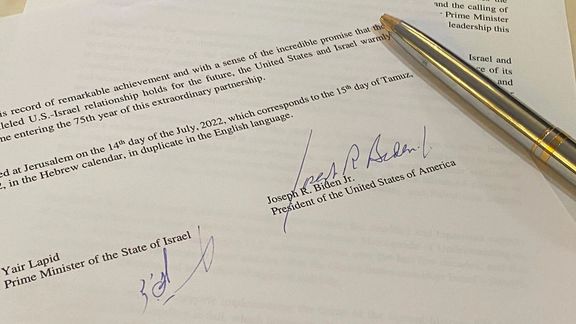
‘Robust regional architecture’
While the declaration noted Biden’s “longstanding and consistent support of a two-state solution” allowing a Palestinian state in Israeli-occupied territories, it pledged to work against “all efforts to boycott or de-legitimize Israel” and “to firmly reject the BDS campaign.” Calls for boycotting and disinvestment from Israeli entities active in the occupied West Bank have gathered momentum since rights groups including Amnesty International concluded that Israeli military rule amounted to a form of apartheid where Jewish settlers had political and civil rights denied to Muslims and Christians.
The Biden-Lapid declaration anticipated Biden’s arrival in Saudi Arabia Friday as part of a process of “building a robust regional architecture.” It hailed Israel’s 2020 ‘normalization’ agreements with Bahrain, Morocco, and the United Arab Emirates as important “to the cause of regional security, prosperity and peace” and hailed March’s Negev summit in Israel – attended by the foreign ministers of of Bahrain, Egypt, Israel, Morocco and the United States – as “efforts to build a new regional framework that is changing the face of the Middle East.”
Officials and hardliner media in Tehran have already condemned the emergence of an Israeli Arab alliance, telling the United States that no regional arrangement “can save the Zionist regime”.
Nour News, close to Iran’s supreme national security council on Thursday threatened that Tehran can use “new methods” for “punishing” Israel, and energy shipments could be endangered in the region. This was a little-veiled threat to shipping in the Persian Gulf and possibly in the Red Sea, where Iran’s Houthi allies have attacked vessels in the past.
Iranian government media simply carried the news of the US-Israeli declaration, as a first reaction Thursday afternoon, but further official and semi-official reaction will follow in coming days.
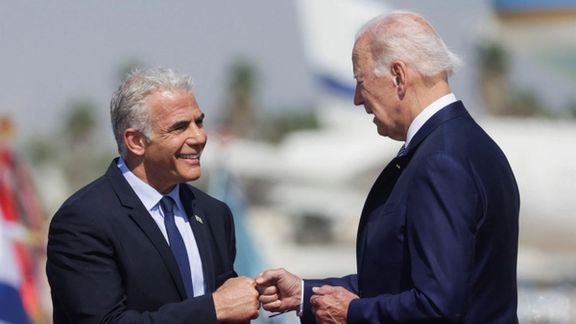
Iran might resort to new methods to “punish” Israel, a website close to its security establishment said on Thursday, as President Joe Biden visits the region.
Nour News close to Ali Shamkhani, the secretary of the supreme national security council also said that “Any steps to disrupt the current security order in West Asia can impact other spheres, such as transportation and transit of energy and add to the existing global food and energy crisis.”
The reference to transportation of energy could be a threat to shipping in the Persian Gulf. Iran in recent and distant past has repeatedly made such threats and in the summer of 2019, attacks took place against many tankers, which were generally blamed on Iran.
The note published by the “international desk” of Nour News also dangled the prospect of continued nuclear talks, as President Joe Biden on Wednesday told an Israeli television that he is willing to use force against Iran “as a last resort.”
The article went on to argue that Israel has always opposed the 2015 nuclear agreement known as JCPOA and is determined to block its revival. In a candid admission of mysterious incidents, Nour News said that Israel has intensified attacks inside Iran in the past year, “to perhaps create chaos and fish in muddy waters…”
Talks since April 2021to revive the JCPOA are now stalled, with Iran speeding up its uranium enrichment, which is seen as a serious step to approach a nuclear weapons threshold.
The United States “has adopted silence toward Israel’s destructive acts,” the article stressed, and has shown its inclination to use these acts to get leverage in nuclear talks. But Washington should know that “Israel’s mischiefs can, under some circumstances, cause loss of control over the situation and lead to the use of different options for punishing the usurping Zionist regime.”
Nour News then picked up the issue of a proposed joint air defense network between Israel and Arab states, ridiculing Israel’s capabilities. It said the current Israeli air defense weapons were for stopping small, short-range rockets and were ineffective against ballistic and cruise missiles, a reference to Iran’s long-range capabilities that have created concern among regional countries.
Nour News had issued a warning on July 10 about US, Israeli and Arab plans to set up a regional air defense system. It said that “the creation of a joint defense pact in the region by the US with participation and hidden management of Zionists is a threatening act.”
The plan to set up coordination between air defenses of Saudi Arabia, Israel, the United Arab Emirates and other allies goes back months. The Wall Street Journal reported in June that a secret meeting took place between top military officers of the countries involved in Sharm El Sheikh, Egypt in March.
Biden’s trip to Israel and Saudi Arabia, his recent tougher stance toward Iran, as wells as talk of steps to establish cooperation between Riyadh and Tel-Aviv have apparently rattled Tehran officials.
President Ebrahim Raisi on Wednesday also warned about a regional alliance aimed at Iran. "if American visits to the regional countries are aimed at strengthening the position of the Zionist regime and normalizing its relations with certain countries, their efforts will not in any way bring about security for the Zionists."
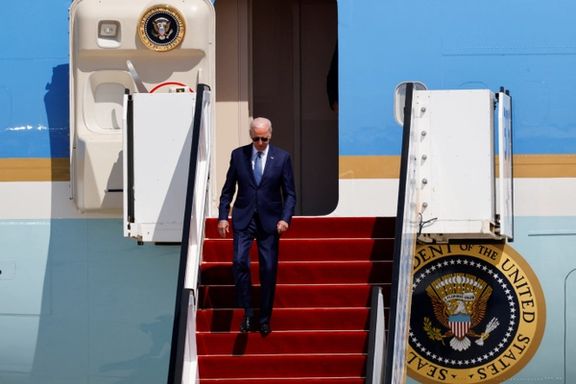
US President Joe Biden reiterated upon arrival in Israel on Wednesday that the only thing worse than Iran now is an Iran with nuclear weapons.”
Biden told Israel’s Channel 12 that he still believes the US should return to the 2015 nuclear deal – formally known as the Joint Comprehensive Plan of Action (JCPOA), noting that the decision is now in Iran’s hands.
About whether the US would use force to stop Iran from attaining a nuclear weapon, Biden said "as a last resort, yes."
He, however, once again rejected Iran’s demand that the Revolutionary Guards (IRGC) be taken off Washington’s list of foreign terrorist organizations as part of any agreement. Asked if he would hold to that position even if it meant no deal, Biden said, “Yes.”
Israel was a staunch opponent of the 2015 nuclear deal and welcomed then-President Donald Trump’s decision to unilaterally withdraw from it, which led to its unraveling, a decision Biden calls a “gigantic mistake” that accelerated Iran’s progress towards a nuclear weapon.
He declined to comment on any discussions with Israel about using military force against Iran, but assured Jerusalem that he will work with whomever is elected as Israel’s next prime minister, even Benjamin Netanyahu, with whom he has had strained relations. “We’re committed to the state, not an individual leader.”
“In order to stop regimes like Iran, economic sanctions are not enough, diplomatic sanctions are not enough. There is no way to stop Iran without a credible military threat,” said Netanyahu, who was not part of the official greeting ceremony for the US president but did shake his hand.